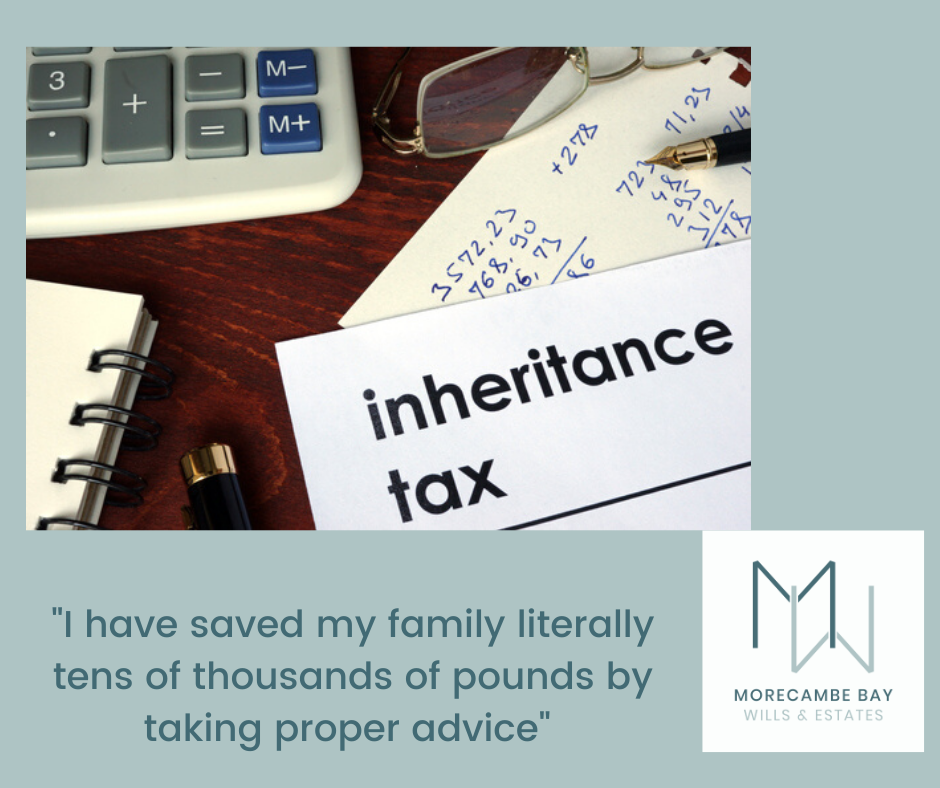For all of us, understanding Inheritance Tax (IHT) is important when you are planning to make a Will. For many of my customers, IHT is never going to be an issue. With smaller estates and a potential to pass on £1 million in property and assets to your family without paying any IHT, most couples have nothing to be concerned about.
But, as always with tax, the rules aren’t straightforward for all of us. When we start a discussion about your Wills, we always talk about IHT so we make sure you know what the rules are and we can take action if it is likely to affect you, or your family in the future.
The Basics
The key to understanding Inheritance Tax is to understand all the terms used. Here we provide a simple explanation of the most common:
Assets
“Assets” includes your share of any property, savings, shares, and any insurance policies that are not written into trust. It does not include pensions, death in service payments or any insurances in trust.
Nil Rate Band
Everyone’s estate is entitled to an allowance on which no tax is paid. This is known as the “Nil Rate Band”, and is currently set at £325,000. Your estate will be taxed at 40 percent on anything over that amount.
Residential Nil Rate Band
There is an additional allowance of up to £175,000 if you are leaving property to your direct descendants. This seems straightforward but you should make sure it is actually allowable because there are some times where it isn’t. We can advise you on this. If this is included, your estate could be worth £500,000 before any tax is payable.
Spousal Exemption
Married couples / civil partners have additional allowances. Any assets passed to your spouse are fully exempt from any IHT, and there is no limit on this exemption. It is crucial to note that this does not apply to partners who are not married or in a civil partnership.
Transferable allowances
There are further advantages for married couples / civil partners too – as unused allowances can be passed on to your spouse. This means if you have passed assets to your spouse first, using the spousal exemption, the total allowance for the second spouse is £1 million. Again, it is crucial to note that this does not apply to partners who are not married or in a civil partnership.
Examples
Example 1 – single person
John’s assets are worth £400,000, this is £75,000 over the Nil Rate Band, meaning his estate will pay 40 percent on that – £30,000. However, if he is eligible for the additional Residential Nil Rate Band, his allowance is £500,000 so no IHT is payable at all on his estate.
Example 2 – married couple / civil partner
John and Jane are married. John’s assets are worth £400,000, and he passes everything to his wife Jane. There is no IHT payable on his estate.
Jane has assets of her own at £400,000 plus the inheritance from John – a total of £800,000. As the property is passed to their children eventually, she can use her own allowances of £500,000 and the unused £500,000 allowances from John’s estate. That gives a total of £1 million before any IHT would be payable.
Example 3 – unmarried couple / civil partner
John and Jane are NOT married. John’s assets are worth £400,000, and he passes his £200,000 share of their house to his children and the other assets totalling £200,000 to his partner Jane. There is no IHT payable on his own estate as it isn’t over his allowance of £500,000.
Jane has assets of her own at £400,000 plus the inheritance from John – a total estate of £600,000. She has no children, so her allowance is only £325,000. That means her estate now has assets of £275,000 over the IHT allowance. So her IHT bill would be £110,000.
Getting the right advice
Understanding Inheritance Tax is critical for planning your estate. There are ways that potential IHT can be reduced, such as using trusts to protect future beneficiaries and making gifts during your lifetime. It is critical that you take advice before preparing a Will. And it’s particularly important if you are unmarried or are due to benefit in future from a large inheritance. We can help save you and your family literally tens of thousands of pounds in tax.
Don’t just rely on making a standard Will, an online Will or a DIY Will, where you don’t have the benefit of a proper discussion around tax. Contact us for a free consultation to understand how Inheritance Tax could affect you and your family, and how we can make sure you are protected for the future. It’s all part of our estate planning service.
You can find out more about inheritance tax at https://www.gov.uk/inheritance-tax
The above is a basic overview and does not constitute specific advice. Everyone’s circumstances are different, and the allowances are not available for every estate.


